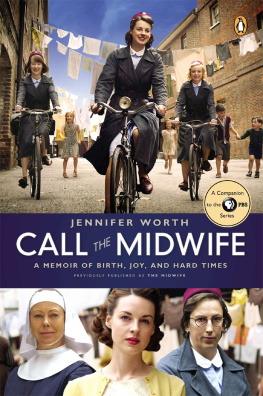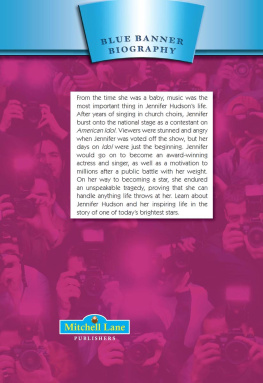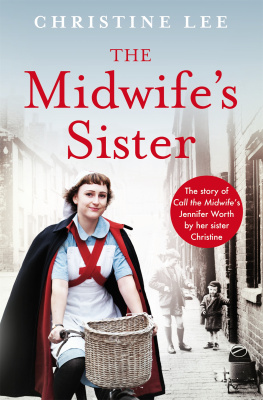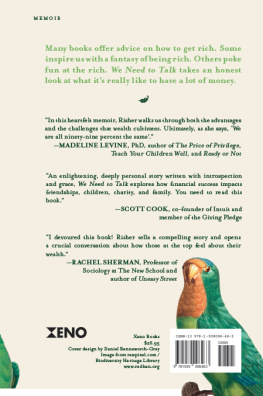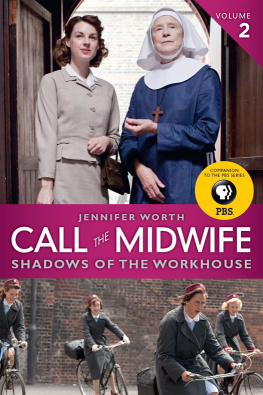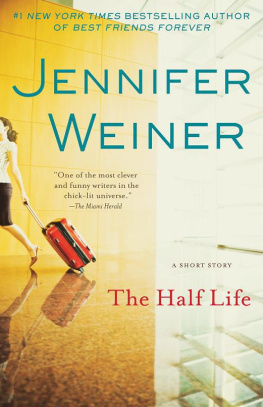Jennifer Worth - In the Midst of Life
Here you can read online Jennifer Worth - In the Midst of Life full text of the book (entire story) in english for free. Download pdf and epub, get meaning, cover and reviews about this ebook. genre: Non-fiction. Description of the work, (preface) as well as reviews are available. Best literature library LitArk.com created for fans of good reading and offers a wide selection of genres:
Romance novel
Science fiction
Adventure
Detective
Science
History
Home and family
Prose
Art
Politics
Computer
Non-fiction
Religion
Business
Children
Humor
Choose a favorite category and find really read worthwhile books. Enjoy immersion in the world of imagination, feel the emotions of the characters or learn something new for yourself, make an fascinating discovery.

- Book:In the Midst of Life
- Author:
- Genre:
- Rating:3 / 5
- Favourites:Add to favourites
- Your mark:
- 60
- 1
- 2
- 3
- 4
- 5
In the Midst of Life: summary, description and annotation
We offer to read an annotation, description, summary or preface (depends on what the author of the book "In the Midst of Life" wrote himself). If you haven't found the necessary information about the book — write in the comments, we will try to find it.
In the Midst of Life — read online for free the complete book (whole text) full work
Below is the text of the book, divided by pages. System saving the place of the last page read, allows you to conveniently read the book "In the Midst of Life" online for free, without having to search again every time where you left off. Put a bookmark, and you can go to the page where you finished reading at any time.
Font size:
Interval:
Bookmark:
Jennifer Worth
In the Midst of Life
Dedicated to Lydia, Daniel and Eleanor and all of their generation
They are the future
In my beginning is my end;
In my end is my beginning.
T.S. EliotIN THE MIDST OF LIFE WE ARE IN DEATH
This book assumes that death is sacred.
It is about the mystery, the beauty, the loneliness and the aspirations of death.
It is about the fear of death, and our inability to handle it.
It is about how we die. Perhaps few people have seen the Angel of Death approach and depart.
It is about the meaning, shape and purpose of life that will some day end.
It is about my own search to understand.
Since girlhood I have pondered these mysteries, reflecting on the deaths I have seen in hospitals and the hopes and fears of people who have come my way.
This book is about the need for peace in the hour of our death.
It suggests that death can sometimes be a friend, and is not always an enemy.
It raises the vexed issue of resuscitation, and the law.
It is about the need to rekindle reverence in the face of death.
It is about the humility of acceptance.
It is about the spiritual nature of death God if you like, or Allah, or Krishna, or Jehovah, or Brahma, or one of a thousand names given to something we cannot understand.
Or just Evolution, Random Chance, or Biochemistry.
It really does not matter what you think or believe.
Death comes for us all.
How, when and where we die has always been a game of chance.
Our determination to control it has not loaded the dice in our favour.
Did anyone ever imagine that it would?
Jennifer Worth
INTRODUCTION
Fifty years of thought, and four years of writing, have gone into the production of this book. The best wine and cheese, we are told, are slow to mature. Let us hope it is the same for books!
It has been written with a strong sense of vocation. Modern medicine was just developing when I started nursing in the 1950s they were exciting days. I was only eighteen, but could see quite clearly that with every new advance in pharmacology and surgery, the acceptance of death was being transformed into denial.
Only those who have seen death are able to talk about it meaningfully. I was privileged to be of that generation of nurses who were required to sit with the dying, and the insights gained from those experiences inform the whole book.
I left nursing in 1973, and although the earlier stories in the book are now medical history, the moral and ethical issues remain the same. But through the professional journals, friends and relatives, and observation, I have kept in touch with medicine and nursing, as the later stories illustrate. In order to bring this book clinically into the twenty-first century, I have asked three professionals who are currently working to write updates on modern medical practice: David Hackett, consultant cardiologist; Madeline Bass, palliative care nurse and teacher; Louise Massen, ambulance service paramedic and clinician. These papers are to be found in the appendices at the end of the book. Readers who are interested in a serious update on professional papers and government reports and directives can find an extensive reading list, but it must be remembered that these are changing all the time, and almost every month new material is added.
Jennifer Worth,
September 2010
1956
A NATURAL DEATH
My grandfather died in 1956 at the age of eighty-six. I loved him deeply and was very close to him. I saw very little of my father during the war, and in the years after. Every girl needs a man in her life, and my dear grandfather gladly filled that role. I treasure a Bible that he gave me for my twenty-first birthday, shortly before he died, with a loving message carefully penned by a shaking hand, unaccustomed to writing. He was barely literate, having left school at the age of eleven to work in a builders yard, and was the oldest of thirteen children, born in 1870, when every child in a working class family had to labour from an early age. At fifteen he lied about his age and joined the army, So that one of my brothers could have my boots, he told me. He had about him a quiet simplicity and wisdom that greatly influenced my childhood, and therefore my whole life.
I remember his tenderness throughout my early years; going for long walks in the countryside, my grandfather pointing out and naming birds, trees and flowers. I remember going to his allotment to dig potatoes, him pushing me in the wheelbarrow and me shouting Faster, faster! I remember helping him to polish shoes, clean the windows, clear out his garden shed, clean the grate and chop the wood and get the coal in. And I remember him growing old.
It was a gradual process. First it was the wheelbarrow. However much I shouted, he couldnt go any faster.
I am getting old, he would say. You get out and run. Your legs are younger than mine.
As I grew older and stronger, he grew older and weaker, and, after a few years, I was the one pushing the wheelbarrow. Soon, digging for potatoes became too much for him, so I dug up the golden white globes. I had always been told that Grandad was hard of hearing, but I had never noticed it when I was little. I prattled on and he always seemed to understand me. I noticed that his nose dripped.
Why is your nose dripping? I asked, pertly.
Dont be saucy, little madam, he replied, taking out his handkerchief and wiping the offending organ. From an early age I remember pulling his skin and watching with interest as it settled slowly back into place. I pulled my own skin, and it bounced back.
Thats as it should be, Grandad said. When you are as old as me your skin will be like mine.
Im never going to grow old! I shouted confidently as I raced down the garden path to his shed, which was always a place of wonder.
My grandmother had died in 1943, of a heart attack, I was told. My grandfather and my mother were with her when she died. My mother told me that he held her in his arms during the last half hour of life, tenderly stroking her face and kissing her. She had died as she had lived, in the protection of her husbands love, and, after her death, he lived alone. They had had eight children, and four of his daughters, including my mother, regularly attended to his needs. Cleaning became a problem. I recall my mother saying,
Dads getting very dirty. I found two pairs of dirty underpants hidden away in the back of his drawer.
And, as I grew older, I was aware that his smell had changed. I had always thought of him as a lovely smell of earth and leaves and smoky old jackets. But it changed. Later on I realised the change in the smell was urine. He was never really incontinent, but most elderly men have prostate problems; it was gradual, and never so noticeable as to be offensive.
Two of his daughters had a small sweetshop at the end of the road. At first, after Grandmas death, they had let Grandad serve in the shop. He enjoyed meeting the customers, and it gives him something to do, my aunts said. A few years later he could not be trusted to give the correct change, and, worse still, he did not seem to notice when his nose was dripping, so in the end he had to be steered gently away. He missed the shop, but said acceptingly. Im getting old, now. You young people must take over.
My grandfather was a Boer War veteran (18981902) and he was, therefore, offered a place as a Chelsea Pensioner, but he refused. He preferred to stay with his family and how grateful I am that he did. My development towards adult life would have been very different, had he accepted.
The doctor came to see him from time to time. My grandfather didnt really need medical treatment, but he got chesty in the winters and so the doctor ordered cough linctus, which probably had no effect. He said, There is nothing wrong. Your fathers quite healthy. He is getting old, well past his three score years and ten. He will just potter on until he fades away.
Font size:
Interval:
Bookmark:
Similar books «In the Midst of Life»
Look at similar books to In the Midst of Life. We have selected literature similar in name and meaning in the hope of providing readers with more options to find new, interesting, not yet read works.
Discussion, reviews of the book In the Midst of Life and just readers' own opinions. Leave your comments, write what you think about the work, its meaning or the main characters. Specify what exactly you liked and what you didn't like, and why you think so.

